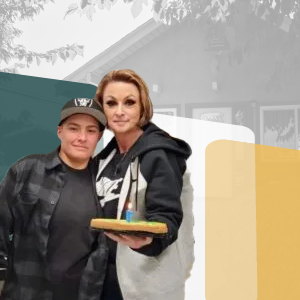Thinking Clearly

“What does Misty want?” That’s what Misty’s counselor asked as they worked through her addiction. With her judgement clouded by alcoholism, Misty struggled to pinpoint the answer. But over time, as she continued to work the program, she began to think clearly and discover the truth about what she wanted for her life.
Raised in a dysfunctional family, Misty was a lonely child. She was sexually abused as a young girl and fell into depression. During high school, her family moved around frequently, and she found herself using alcohol to numb her feelings. In her 20s, she was deep into the party scene, using alcohol not only as a comfort but also as a method to feel bold and glamorous. Misty said, “It was a comfort. It was my medicine. It gave me courage to talk and be bolder. I was wittier and prettier when I drank.”
But in retrospect, she said, “I didn’t realize how lonely I was.”
When her boyfriend went through AA, she discerned that her family had suffered with addiction when she was growing up but thought it would never happen to her. As she dipped deeper into her own alcoholism, she would lose her inhibitions and “confuse all kinds of things with love.”
Misty’s first husband was an abusive alcoholic. They had two children together, but Misty continued her drinking habits. She admits that she was a functioning alcoholic but didn’t realize it at the time. She was able to keep up with her job while drinking only after work and on weekends. She said, “It became an issue when I started having a drink before work. It became a necessity; my body needed it to keep going.”
That daily alcohol abuse lasted 4-6 years and did a great deal of damage in her life. But she wasn’t thinking clearly. Even when she lost her job, Misty did not worry. She said, “Drinking takes your cares away and becomes your life.”
She became homeless when the house she was living in was sold. She said, “I didn’t care as long as I had more alcohol.” She became a bartender and bounced from place to place for a place to sleep.
Finally, she began to feel miserable when she was drinking. She said that she became a “mean drunk” and that suicide became a tempting alternative. After a couple of failed suicide attempts, she said, “I knew I had to quit but didn’t know how.” Fortunately, a doctor told her about the withdrawal management program at Cedar House.
For six days, she detoxed from alcohol at Cedar House, followed by another 106 days in the residential program. During that time, she said, “I learned so much of myself and why we turn to alcohol. It wasn’t just three hots and a cot for me.” She learned that she had developed a mental disorder in connection with her alcohol abuse and worked with her counselors to heal.
About the staff at Cedar House, Misty said she was most impressed with “their understanding of the disease; their knowledge; their experience; and their ability to pinpoint where I needed to start.”
She felt safe at Cedar House and worried about “what’s going to happen when I get home.” After graduating from the program, she made an effort to rearrange her room and her life when she went home. When she found herself starting to get complacent, she went to a meeting her friend was leading. From then on, she has gone to a meeting every day. She said, “You can only take it one day at a time. You have to truly work the program. I am definitely a changed person.”
Misty’s Case Manager Salena gave her a packet with information on feelings and emotions when she was at Cedar House that Misty continued to refer to for answers. She knew that the question: “what does Misty want?” was an important one that she needed to learn to answer by understanding her own feelings. She said, “Those questions are hard when you’ve been clouded.” She is proud to say that, a year later, by taking it one day at a time, she is a changed woman who is thinking clearly.


When Steven was in his final days of treatment at Cedar House, he took time to write about his experience and share his story with his group. This is his heartfelt reflection in his own words: My name is Steven, and I am a recovering drug addict. Throughout my life I have used a variety of drugs from marijuana, cocaine, meth, and heroin to fentanyl. There would be times when I would hear people share and say that they are just like me. But I am not going to do that today, because I have no idea of what your stories are. What I would like to do is share a little bit of my story and what I have been through, and maybe you can relate to it. In my story, I took a path with so much pain and adversity. I would hide the pain from everyone. At a very young age, I was molested. This started my journey of PTSD and drug addiction. I would hide and isolate from people because I was terribly afraid of what people would think of me. I felt ashamed for what had happened to me. So, when my sister offered me drugs at a young age, I did them with her, and I felt a sense of relief. It would numb the pain and embarrassment that I felt from what had happened. My self-pity drove me into doing more and more drugs. I would blame myself for what that person did to me. I was so angry that I had no control over what had happened. I was just a child. I bottled up my feelings and buried them deep down inside. It would eat at me every day -- day in and day out. Growing up, the pain would lurk its ugly head. The worst it ever got was when I was alone in the dark. I felt so much fear growing up. This is something I had to overcome and learn from. Life is so interesting. It makes us walk through different paths of choices. We are unable to see the destruction and pain we are about to go through. These challenges mold us and makes us the people we are today. There are two experiences that I would like to share with you today. The first is my divorce and the second is the death of my sister. These events steered me into a life of addiction, and I hope my message can help change at least one life. I know that I felt exhausted from the life of chasing -- chasing for a cure that would never appear. My divorce was not something simple. It ate at me every day. I got there through a series of issues that happened. I was fired from my job. I had to sell my home that I bought for my now ex-wife and my unborn son. I sat and cried in my son's room alone because I felt like a failure. During all of this, I was hiding my addiction until I couldn't handle it anymore. My wife found out and kicked me out of our apartment. I felt so angry, I felt like she threw me out like trash. I was acting like a child, instead of dealing with it like I should have. I was so hard on myself. I felt like I was losing control, but the lesson to this is to allow things to go. I needed to surrender to this. I also learned that I needed to ask for help instead of hiding from the issues. This takes me to my next lesson -- when my sister passed. When my sister passed away, it was seven days of hell. She passed due to multiple abscesses, one on each arm and one in her stomach. I stayed up for seven days changing her bedding because she would either defecate or urinate on herself. I cleaned her and watched her as she tried to sleep but couldn't because of the pain. I tried to plead with her to let me call 911 because at the time, I had no idea what was happening. She would say, "No, I want to wait for mom to come home." Our mother was away on vacation visiting family out of the country and would return in seven days. I can still hear her cries of agony, day after day. She made me promise that I wouldn't call 911 until our mother returned. So, I kept that promise and kept her secret. I never knew what an abscess was and how serious it would become. After the 7 days were up, our mother returned home. The next morning, we called 911. My mother was frantic and didn't know what to do. Even in agony my sister lied to the EMTs; she said nothing about her use. My sister wanted our mother to not find out her secret. I couldn't stay quiet any longer, I told the EMTs everything, but it was too late. My sister passed away after two days. The doctors tried to take the contaminated blood out of her system, but nothing they did helped. It was just too late. Prior to all of this, I would plead with my family to help my sister. They just did not want to believe that there was a problem. During her funeral, everyone was upset and saying they could have done this or that. I was so disgusted with my family that I didn't attend. I wanted to remember my sister by the good times and not the last seven days of her life. I felt so much guilt over what had happened. I had to deal with the pain. I had to let go of the resentment, anger, fear, sadness, judgement, secrets, hurt, blame, and guilt. I had to put my faith in something more. I had to put my faith in a higher power. So, I had to make some changes in my life. I started making commitments. Making a commitment every day to stay sober requires faith. If I make the necessary changes, things will get better. I need to accept that some choices and things are out of my control, and I need to be okay with that. I will trust myself in making the changes that are needed and have pride in myself. My selfishness will be in my sobriety and not in negative actions towards people. Faith can be anything I desire it to be. Cedar House has taught me to take responsibility in myself, my actions, my behavior and, most importantly, in my addiction. Throughout this journey, I have learned to love myself again, to work on my character defects, and to gain so many new brothers in sobriety. In life, so many people make mistakes, and you can choose to get up and make the necessary changes or get beat down. And I was beat down over and over again. I walked into rehab beaten, bruised, and broken. It was challenging, but over time the bruises healed and the bones that were broken started to heal as well. I am grateful to overcome the mountain of rehabilitation. I didn't do this by myself. It took a brotherhood of men who were broken and beaten, too. We all faced our fears in our own time. It also took the patience and care of our counselors. They gave us guidance and advice that we desperately needed. They were the lighthouse to our battered ships. Without them we wouldn't know which way to steer. To my brothers in the war of sobriety, I say, my love goes out to you, to the ones who are healing, and to the ones who still need help. To the staff of Cedar House, no amount of gratitude will express how much I am thankful for. You revived my broken soul. I will end with one final thing to my brothers, you're not alone.

As a teenager, Sabrina overcame the challenges of bouncing around numerous foster and group homes, frequently being rejected for her sexuality. She emancipated from the system and prepared herself to start school. The company she kept, unfortunately, led her down a dark path instead. The young woman with whom Sabrina had a relationship since the age of 15 was a drug addict. She used meth on a regular basis and tried to convince Sabrina to join her. Sabrina wasn’t interested. As a matter of fact, she argued with her girlfriend time and again begging her not to use. But ultimately, there came a time when Sabrina lost that argument and was persuaded to try using meth herself. She was living in a group home in Pasadena when it happened. Sabrina said, “I can’t count how many group homes and foster homes I had lived in.” Her girlfriend and roommate surprised her by using meth in her room while she was in the shower. She said, “I was scared of meth. I wouldn’t touch it.” When she entered the room and saw that they were using, they fought for a long time before her girlfriend finally said, “If you love me, you’ll try it.” And that was the final straw. Shortly after that first experience with meth, Sabrina and her girlfriend, both addicted, were kicked out of the group home. She was homeless, hadn’t started school and was barely getting by with cash aid and food stamps. Even at times when Sabrina wasn’t interested in getting high, her girlfriend would manipulate her into using. Sabrina lived under a bridge on a binge in Pomona for three years. During that time, she met up with an old boyfriend which led to an unexpected pregnancy. She said, “I didn’t even know I was pregnant until I went into labor. I was so high and so skinny.” The paramedics immediately took the baby girl away, but that was a turning point for Sabrina. She said, “I fought tooth and nail to get her back.” Her social worker asked if she would be willing to go to rehab in order to gain custody of the baby, and Sabrina wholeheartedly agreed. She called every day to inquire about getting into a residential program. In March 2018, she was admitted to the Maple House program. She simply wasn’t ready. During her stay at Maple House, she was rude, disobedient and angry. By May she had made very little progress, and her behavior led to her dismissal from the program. A few months later, she entered another rehab program where she served as kitchen coordinator and began to make some progress toward sobriety. She got in trouble there for breaking rules and was dismissed from that program as well. Next, she tried an outpatient program and continued staying clean and sober. She moved into a sober living facility. When one of her drug tests came out questionable, she had to leave that home, too. She said, “I ended up losing my home and losing faith again. I went back to the streets in Pomona.” On February 21, 2019, her social worker managed to get her back into the treatment program at Maple House. This time she was ready. She loved her counselors and learned so much from them. Sabrina said, “They really helped me through it. Rosanna opened my mind. Rita taught me to cook and gave great advice. They were always there to listen, and they motivated me to do good. I could talk to them instead of getting angry.” At Maple House, Sabrina learned the importance of surrounding herself with kind-hearted people who not only care about her, but also continuously build her up to be the woman she was born to be. She has been sober for nearly two years and is the proud mother of two young girls.


Share On: